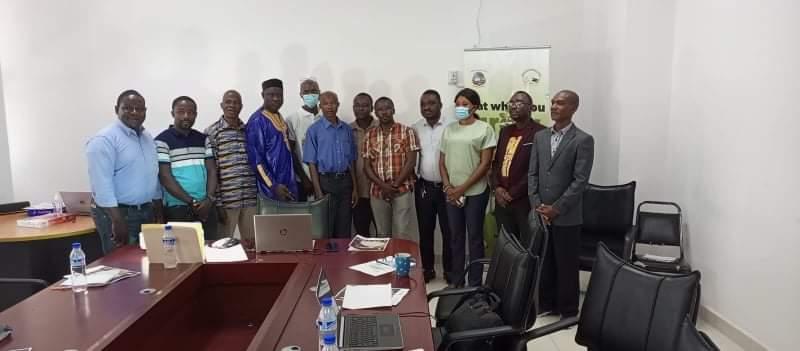Monrovia- The African Seed Access Index (TASAI) has released its draft report on the Liberia seed sector or Industry with several improvements, showing an increase in the number of varities but only 4% of local farmers are using certified seeds.
TASAI has been sponsored by Bill & Milinda Foundation, AGRA, USAID, AATF, Development Gateway, Kenya Market Trust, Adam Smith International, UKaid, ELNA RDC and Market Matters, Inc.
The report was presented earlier this week in the Liberian capital.
Presenting finding of the report on behalf TASAI Liberia chapter, Mr. Quaqua Mulbah, a research officer at the Central Agriculture and Research Institute (CARI) and consultant for TASAI said that the research was conducted to track the progress of Liberia in the seed sector or Industry.
The research was focused on four indicators namely, research and development, industry competitiveness, seed policy and regulations and institutional support including service to smallholder farmers.
According to Mr. Mulbah, the draft report was presented and later a discussion was center around on how to promote farmer seed sectors and benefits of smallholder farmers.
The study was conducted and a draft report has been distributed to the various stakeholders from seed sector, stakeholders from the Ministry of Agriculture, seed producer and CARI to share their thoughts on the report.
The survey was conducted through report from stakeholders, institutions, Ministry of Agriculture Countries Coordinators, Ministry of commerce and Industry from 2010 up to the completion of the report.


CARI research officer and TASAI consultant further added that the formal seed industry has had lot of improvement in the seed industry since 2010 and 2014, adding that from the past there was no strong policies put in place to regulate the sector.
Until 2019, when the seed industry benefited from the recent adoption of the Liberia Seed development certification agency (SDCA), Regulations (MOA 2021), seed policy and national policy which was approved by MOA and also have the regional harmonize policy which will serve guide or frame work documents to be used in the seed industry.
Narrating further, Mr. Mulbah also that report was meant to highlight the performance of Liberia seed sector or Industry over the years since 2017 and to galvanized support from government and other partners to the seed industry.
For his part, the Director General of CARI, Dr. Victor Sumo lauded the TASAI and MOA and other partners adding that there are competitiveness in the seed sector.
Mr. Sumo said even though they have some challenges in the report, they made a tremendous improvement
According to him, an element has been formulated into one document called the plant protection act which addresses some of the challenges in the seed sector such as importation of fertilizer.
But there is task lies ahead of them to perform which is strengthening institutions.
CARI is the only public institution known for varieties development but has done some work at the National seed board who has some some registration but need to do more.
The report also include the number of varieties sold in 2017, which show an increase in the number of varieties sold in the Country often reflects an increase choice of varieties available to farmers.
The seed producers surveyed in 2017, sold a total of 29 varieties of the four crops to farmer among which 19 rice eight maize, one groundnut and cowpea varieties.
Varieties release in three years
The crops specific number of varieties released in the last three years is an indicator of the performance of the variety development and release system.
The greater the number of varieties release in a country, the higher the chances of enhancing smallholders’ access to improve seed. In addition to higher yield, new varieties often carry desired traits such as climax smartness, disease and pest resistance and enhanced nutrition.
TASAI report also said it interviewed 41 registered seed producers, 35 cooperative and individual producers and six seed companies in 2017.
Accordingly, since seed producers were not interviewed in 2021, instead, the data presented in table 9 was provided by CARI.
Conclusion of the report
Liberia’s seed sector is at the nascent stages of growth (Ariga et al 2019). Countries in the nascent stage of seed sector development lack key policy and institutional frameworks for a formal seed sector.
With less than 4% of farmers utilizing certified seed for the key crops in Liberia, there is significant room for growth (LISGIS 2017). While, the 2020 TASAI Liberia study has revealed areas for improvement and it also highlights positive aspects of the seed industry, most of which are the result of recent improvement and programs initiated by the government.
Tracking of cases of sale of counterfeit seed is hampered by lack of process to do so at the Ministerial level. In addition, seed inspection services are not equipped to track the sources of counterfeit seed. Further the seed act and regulations do not stipulate specific fines for offenders caught selling counterfeit seed.
Challenges
Several challenges were outlined in the report including lack of funding, seed inspectors, among several others.
After the presentation, a discussion was held among participants where it was interactive and some errors were highlighted but some participation felt dissatisfied, because vegetables were not part of the report release when vegetables derived from seed.
But vegetables planters have been assured that they will be included in the next report.
The TASAI report was compiled by Edward Quaqua Mulbah, Alaric Mienwipia, Michael Waithaka, Mainza Mugoya, Kristina Tihanyi and George Kanyenji.

